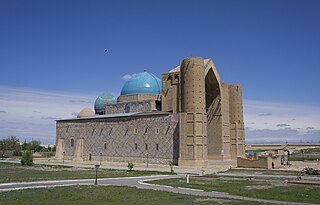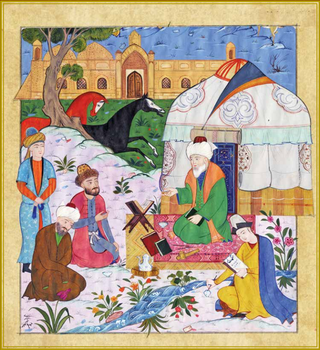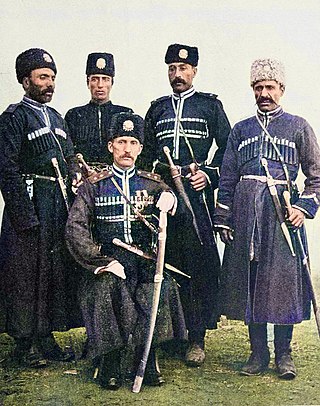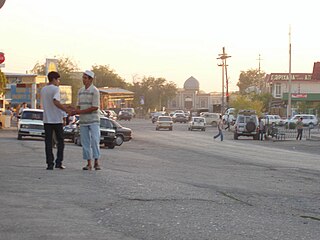
Central Asia is a subregion of Asia that stretches from the Caspian Sea in the southwest and Eastern Europe in the northwest to Western China and Mongolia in the east, and from Afghanistan and Iran in the south to Russia in the north. It includes Kazakhstan, Kyrgyzstan, Tajikistan, Turkmenistan, and Uzbekistan. The countries as a group are also colloquially referred to as the "-stans" as all have names ending with the Persian suffix "-stan" in both respective native languages and most other languages.

Uzbekistan is a landlocked country in Central Asia. It is itself surrounded by five landlocked countries: Kazakhstan to the north; Kyrgyzstan to the northeast; Tajikistan to the southeast; Afghanistan to the south, Turkmenistan to the south-west. Its capital and largest city is Tashkent. Uzbekistan is part of the Turkic languages world, as well as a member of the Organization of Turkic States. While the Uzbek language is the majority spoken language in Uzbekistan, Russian is widely used as an inter-ethnic tongue and in government. Islam is the majority religion in Uzbekistan, most Uzbeks being non-denominational Muslims. In ancient times it largely overlapped with the region known as Sogdia, and also with Bactria.
The Uzbeks are a Turkic ethnic group native to the wider Central Asian region, being among the largest Turkic ethnic group in the area. They comprise the majority population of Uzbekistan, next to Kazakh and Karakalpak minorities, and are also minority groups in Afghanistan, Tajikistan, Kyrgyzstan, Kazakhstan, Turkmenistan, Russia, and China. Uzbek diaspora communities also exist in Turkey, Saudi Arabia, United States, Ukraine, Pakistan, and other countries.

The Turkic peoples are a collection of diverse ethnic groups of West, Central, East, and North Asia as well as parts of Europe, who speak Turkic languages.

Turkestan, also spelled Turkistan, is a historical region in Central Asia corresponding to the regions of Transoxiana and East Turkestan (Xinjiang). The region is located northwest of modern day China, and directly to the east of the Caspian Sea. Turkestan is primarily inhabited by Turkic peoples, as well as Russian and Tajik-Persian minorities. Turkestan is subdivided into Afghan Turkestan, Russian Turkestan, and East Turkistan. Today, "Turkestan" mainly refers to Xinjiang, where Turkic peoples constitute more than half of the population.

Chagatai, also known as Turki, Eastern Turkic, or Chagatai Turkic, is an extinct Turkic language that was once widely spoken across Central Asia. It remained the shared literary language in the region until the early 20th century. It was used across a wide geographic area including western or Russian Turkestan, Eastern Turkestan, Crimea, the Volga region, etc. Literary Chagatai is the predecessor of the modern Karluk branch of Turkic languages, which includes Uzbek and Uyghur. Turkmen, which is not within the Karluk branch but in the Oghuz branch of Turkic languages, was nonetheless heavily influenced by Chagatai for centuries.

Pan-Turkism or Turkism is a political movement that emerged during the 1880s among Turkic intellectuals who lived in the Russian region of Kazan (Tatarstan), South Caucasus and the Ottoman Empire, with its aim being the cultural and political unification of all Turkic peoples. Turanism is a closely related movement but it is a more general term, because Turkism only applies to Turkic peoples. However, researchers and politicians who are steeped in the pan-Turkic ideology have used these terms interchangeably in many sources and works of literature.

Turkmens are a Turkic ethnic group native to Central Asia, living mainly in Turkmenistan, northern and northeastern regions of Iran and north-western Afghanistan. Sizeable groups of Turkmens are found also in Uzbekistan, Kazakhstan, and the North Caucasus. They speak the Turkmen language, which is classified as a part of the Eastern Oghuz branch of the Turkic languages.

Islam is the largest religion practiced in Kazakhstan, with estimates of about 74% of the country's population being Muslim. Ethnic Kazakhs are predominantly Sunni Muslims of the Hanafi school. There are also small numbers of Shias. Geographically speaking, Kazakhstan is the northernmost Muslim-majority country in the world, and the largest in terms of land area. Kazakhs make up over half of the total population, and other ethnic groups of Muslim background include Uzbeks, Uyghurs and Tatars. Islam first arrived on the southern edges of the region in the 8th century from Arabs. According to the Constitution, The Republic of Kazakhstan proclaims itself as a democratic, secular, legal and social state whose highest values are a person, his life, rights, and freedoms.

Turkistan is a city and the administrative center of Turkistan Region of Kazakhstan, near the Syr Darya river. It is situated 160 km (100 mi) north-west of Shymkent on the Trans-Aral Railway between Kyzylorda to the north and Tashkent to the south. Its population has increased in ten years from 102,505 to 142,899. Turkistan's most prominent historical and cultural asset is the Mausoleum of Khoja Ahmed Yasawi, a UNESCO World Heritage site. The city is served by Hazrat Sultan International Airport.

Haji Bektash Veli was an Islamic scholar, mystic, saint, sayyid, and philosopher from Khorasan who lived and taught in Anatolia. His original name was Sayyid Muhammad ibn Sayyid Ibrāhim Ātā. He is also referred to as the "Sultan of Hearts" and the "Dervish of the Dervishes".

Turkish people or Turks are the largest Turkic people who speak various dialects of the Turkish language and form a majority in Turkey and Northern Cyprus. In addition, centuries-old ethnic Turkish communities still live across other former territories of the Ottoman Empire. Article 66 of the Turkish Constitution defines a Turk as anyone who is a citizen of Turkey. While the legal use of the term Turkish as it pertains to a citizen of Turkey is different from the term's ethnic definition, the majority of the Turkish population are of Turkish ethnicity. The vast majority of Turks are Muslims and follow the Sunni faith.

Ahmad Yasawi was a Turkic poet and Sufi, an early mystic who exerted a powerful influence on the development of Sufi orders throughout the Turkic-speaking world. Yasawi is the earliest known Turkic poet who composed poetry in Middle Turkic. He was a pioneer of popular mysticism, founded the first Turkic Sufi order, the Yasawiyya or Yeseviye, which very quickly spread over Turkic-speaking areas. He was a Hanafi scholar like his murshid, Yusuf Hamadani.

The Karapapakhs, or Terekeme, are a Turkic people, who originally spoke the Karapapakh language, a western Oghuz language closely related to Azerbaijani and Turkish. Nowadays, the Karapapakh language has been largely supplanted by Azerbaijani and Turkish.

The Lyuli, Jughi or Jugi are a branch of the Ghorbati people living in Central Asia, primarily Tajikistan, Uzbekistan, Turkmenistan, Kazakhstan, and southern Kyrgyzstan; also, related groups can be found in Turkey, and the Balkans, Crimea, Southern Russia and Afghanistan. They speak ethnolects of the Persian and Turkic language and practice Sunni Islam. The terms Lyuli and Jugi are considered pejorative. They have a clan organization. Division into sub-clans is also practiced. The Lyuli community is extremely closed towards non-Lyuli.

Sayram (Kazakh: Сайрам, Sairam, Kazakh pronunciation:[sɑjɾɑm];is a rural locality located in eastern Shymkent on the Sayram Su River, which rises at the nearby 4000-meter mountain Sayram Su. In medieval times, the city and countryside were located on the banks of the Arys River, into which the Sayram Su river flows. Since 2018, it has been part of Shymkent City. Population: 30,887 ; 25,408.

The Organization of Turkic States (OTS), formerly called the Turkic Council or the Cooperation Council of Turkic Speaking States, is an intergovernmental organization comprising all but one of the internationally recognized Turkic sovereign states: Azerbaijan, Kazakhstan, Kyrgyzstan, Turkey, and Uzbekistan; while Hungary and Turkmenistan are observers. Its overarching aim is promoting comprehensive cooperation among the Turkic peoples. First proposed by Kazakh president Nursultan Nazarbayev in 2006, it was founded on 3 October 2009 in Azerbaijan's Nakhchivan. The General Secretariat is located in Turkey's Istanbul.

Afghan Turkmens or Turkmens of Afghanistan live in the north-west of Afghanistan along the border with Uzbekistan and Turkmenistan, surrounded by a larger group of Afghan Uzbeks. The number of Turkmens in Afghanistan is estimated at 1 million people or roughly 2-3% of the population of Afghanistan.

Uzbek literature refers to the literature produced and developed in the Republic of Uzbekistan with additional literary works contributed by the Afghanistan, Tajikistan, and Kyrgyzstan people of Central Asia. Influenced by Russian and Turkish literature, Uzbek is predominantly written in the Uzbek language with its roots in Chagatai language, one of the widely accessible languages in the region from 14th to 20th century. In Uzbek literature, Chagatai plays an important role as a reference point.




















